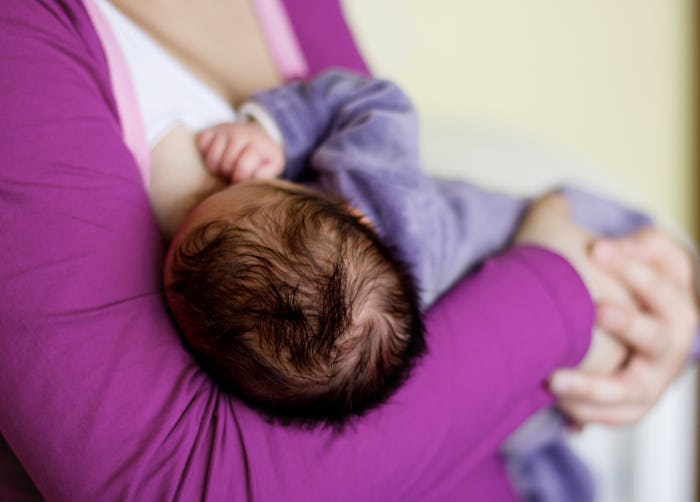Life

Can Breastfeeding Make You Sick? Here's What Nursing Moms Should Know
While there's certainly more than one way to feed your child, there are some unique benefits to breastfeeding. From a specific type of shared closeness, the ability to feed on demand, to the ability to have your baby's food "built in" and made specifically for their nutritional needs, nursing is often a positive choice for many moms. That doesn't mean it's all sunshine and rainbows, though. So, can breastfeeding make you sick? Especially when you're postpartum and recovering from childbirth, it's important to know what you may or may not be getting your body into.
Kelly Bonyata, BS and International Board Certified Lactation Consultant, tells KellyMom that there's a small percentage of breastfeeding moms who experience consistent nausea in those first weeks after the baby is born. It's a response to the release of oxytocin during the milk let-down period. The nausea is similar to what's experienced during pregnancy and, as a result, may come and go in waves. Dr. Ruth Lawrence, author of Breastfeeding: A Guide for the Medical Professional, tells KellyMom that the physical side-effects of breastfeeding are close to what you'd experience with low blood sugar, and include nausea, headache, and intense hunger. That nausea, however, will probably go away by postpartum week eight — unless something else is causing it.
Another possible reason a mom might experience nausea while breastfeeding could have to do with food and water intake. BreastfeedingProblems.com suggests nursing moms make sure they're taking in enough calories to fulfill both their baby's nutritional needs, as well as their own. If your body doesn't have enough calories to both make breast milk and meet your own needs, it becomes deficient and, as a result, you feel sick. The same goes with water. Without sufficient water intake (about three glasses before a feeding), you can easily become dehydrated. Other causes of nausea could be hormonal shifts as your body recovers from childbirth, your baby's growth spurt (which makes them drink more milk and depletes you faster), an infection, or, if you lost a lot of blood during delivery, iron deficiency. If you're feeling especially tired after having a new baby and breastfeeding, you could be more prone to illness when you're postpartum.
Another possible reason for sickness could be hormonal and related to the actual release of milk. Renee Beebe, M.Ed., IBCLC, Lactation Consultant and postpartum doula, tells Second9Months.com that sickness can happen when the hormones dramatically rise and fall during the milk ejection reflex (MER) happens. It's a psychological response to milk release and has no bearing on something you may or may not have done. In fact, even if you're in good spirits and feeling well beforehand, the milk release can trigger this response, like a reflex. Usually the feeling goes away after the MER finishes and gradually diminishes through the course of breastfeeding. Bebee suggests breastfeeding moms practice breathing exercises and/or alternate coping mechanisms to help manage this uncomfortable physical response. And, as always, you can (and should) consult your doctor if symptoms persist.
Finally, if everything else has been ruled out and you notice engorgement in the breasts, you could have mastitis — an infection caused by bacteria facilitated by the combination of you sore, cracked nipples and your baby's saliva. It can make breastfeeding a miserable experience, to say the least. Symptoms, aside from painful, enlarged breasts, might be fatigue, fever and chills, nausea, vomiting, dizziness, and fainting or confusion. If these symptoms are accompanied by pus, redness, or swelling, you should seek immediate medical treatment.
No matter your symptoms, every woman's particular experience with breastfeeding and how it impacts their individuals bodies will vary. As as result, when you're postpartum it's important that you check in with yourself often, and repot anything unusual to your doctor. There's nothing wrong with asking questions and seeking support so you can meet your breastfeeding goals (and without feeling like sh*t).
Check out Romper's new video series, Bearing The Motherload, where disagreeing parents from different sides of an issue sit down with a mediator and talk about how to support (and not judge) each other’s parenting perspectives. New episodes air Mondays on Facebook.